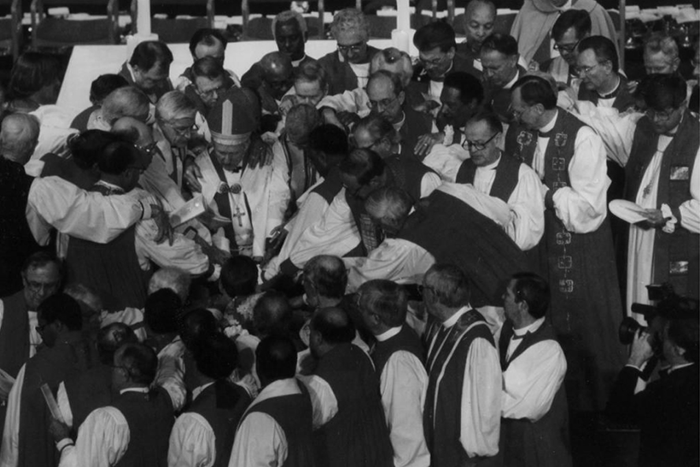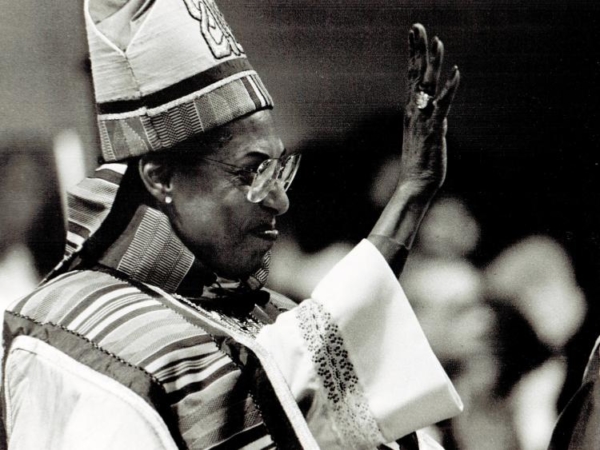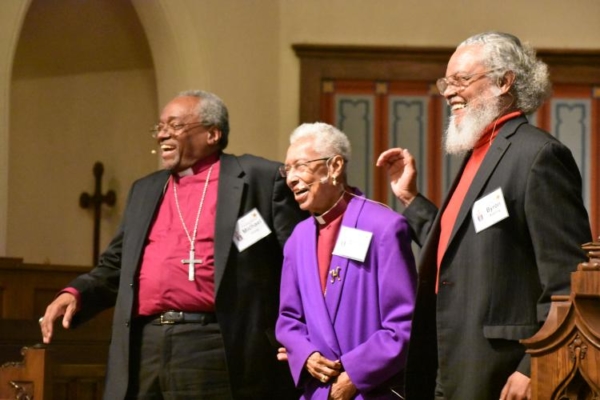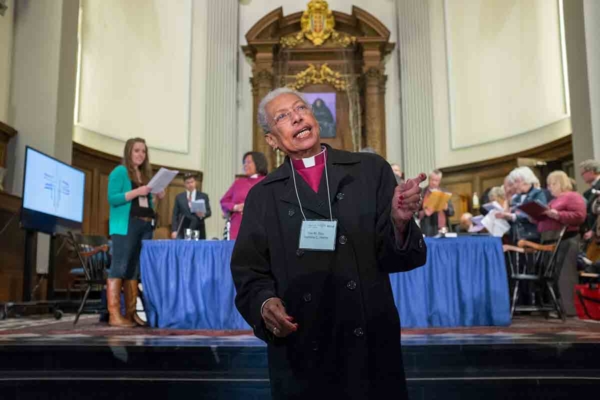Bishop Barbara Harris (1930-2020)

Barbara Harris, the first woman in the Anglican communion to be consecrated a bishop, died in March 2020. Two articles about her appear below. Others can found by googling her name.
Her consecration took place on 11 February 1989 in Boston. At that time, the Anglican Church in Australia had women deacons in dioceses around the country, even in Sydney. Another tortured debate on women in the priesthood was due to take place that August.
Assisted with MOW funds organised by Susan Sandford and Kathleen Toal (MOW national secretary and treasurer), president Patricia Brennan travelled to Boston for the historic occasion. (Correspondence and material relating to this are among her papers in the Mitchell Library in Sydney.) While she was there Patricia spoke with the Rev Li Tim Oi, first woman ordained a priest in the Anglican Communion forty-five years earlier. A recording of that short conversation with Li Tim Oi’s voice as quiet and fragile as a flower against the background hubbub at the consecration, is in the State Library of SA among Janet Scarfe’s records.
The following year, the Rev Penny Jamieson was elected Bishop of Dunedin and Susan Sandford travelled to NZ for her consecration. One of the pleasures of her somewhat hair-raising trip was meeting Bishop Harris, a woman of great warmth and concern. Penny came to Australia several times while she was diocesan bishop and was a key participant in ‘Astonishing Women’, the first (and perhaps only conference) of ordained Anglican women in Australia in Sydney in 1995.
The first article about her remarkable life (and times) is from the Anglican Communion News Service (ACNS), and was published on 17 March 2020. The second, by Tracy Sukraw, was published the Episcopal News Service (ENS) on 14 March 2020.
Tributes paid following death of Barbara Harris – the Anglican Communion’s first female bishop

Tributes have been paid to Bishop Barbra Harris after her death on Friday in Lincoln, Massachusetts. Bishop Barbara, the first woman to be consecrated as bishop in the Anglican Communion, was admitted to hospital in Boston on 29 February with serious gastrointestinal symptoms. She underwent surgery on 1 March but her condition continued to weaken. After several days being kept comfortable in hospital she was transferred to at Care Dimensions Hospice House, where she died on Friday (13 March). She was 89.
The Presiding Bishop of the US-based Episcopal Church, Michael Curry, has led tributes to Bishop Barbara. “Bishop Harris was not large of physical stature. In fact, the opposite”, he said. “But she was larger than life.
“She was larger than life because she lived it fully with her God and with us. She did it by actually living the love of God that Jesus taught is about. She did it walking the lonesome valley of leadership, paving a way for so many of us whose way had been blocked. She did it lifting her voice for those who had no voice. She did with a joke, a whispered word, a secret joy in spite of anything that got in her way, including death. No wonder she titled her memoir, ‘Hallelujah, Anyhow!’”
Bishop Alan Gates, the Bishop of Massachusetts, a diocese she had served for more than three decades, said: “Our hearts are truly heavy at the loss of one who has been a faithful and altogether irrepressible companion, pastor and inspiration to us in the Diocese of Massachusetts for 31 years. At the same time our hearts are truly buoyed by the hope which she preached and the conviction she embodied for us throughout all these years.”
The House of Deputies is the US-based Episcopal Church General Convention (synod) house for priests and laity. Its President, Gay Clark Jennings, said: “It is almost impossible to imagine the Episcopal Church without Bishop Barbara Harris. . . Barbara was fierce, faithful, and, as a journalist once called her, ‘memorably direct’ in her insistence that the Episcopal Church pursue justice for all of God’s people.
“Barbara was always completely and totally Barbara. She never pretended to be anyone other than who she was, and she told the truth no matter what the cost. Often that cost was paid with the comfort and dignity of institutional leaders who were, in her view, insufficiently interested in standing with the marginalised and the vulnerable. They learned quickly that her passion for justice was matched only by her wicked and fearless sense of humour.”
Tributes were also paid by the Bishop of Indianapolis, Jennifer Baskerville-Burrows – the first black woman to serve as a diocesan bishop in the US-based Episcopal Church. “I have no experience of the Episcopal Church without Bishop Barbara Harris”, she said. “The year she became the first female bishop in the Anglican Communion – 1988 – I had just finished college and was preparing to be baptised.
“I had a subscription to Episcopal Life, our old denominational monthly publication, and I read with wonder its stories about her as I was studying what it meant to be a Christian, to be an Episcopalian. Later, as I prepared for ordination, my practical theology was shaped by The Witness, a publication where Barbara served as publisher for years. Her ministry quite literally helped form my faith.
“In the decades since then, I have watched Barbara from far and near. She was my friend and mentor, and having her participate in my consecration in 2017 was an extraordinary gift. Shortly after that, I was asked to offer an endorsement of a book of conversations between Barbara and Presiding Bishop Michael Curry. In that moment, I understood with new force the privilege and responsibility of the legacy that I and so many of my sisters have inherited from her.”
Barbara Harris was born on 12 June 1930 in Philadelphia, Pennsylvania. She worked as Head of Public Relations for the Sun Oil Company before her call to ministry. She was ordained a deacon in 1979 and a priest the following year. In 1998, bishops at the Lambeth Conference resolved that the question of the ordination of women to the episcopate was one for each province to make. Later that year, she was elected to serve as Bishop Suffragan of Massachusetts and was consecrated on 11 February 1989, becoming the first female bishop in the Anglican Communion.
 Bishop Barbara Harris is consecrated on 11 February 1989
Bishop Barbara Harris is consecrated on 11 February 1989
The decision was controversial and Bishop Barbara received a torrent of abuse, including death threats. “I certainly don’t want to be one of the boys”, she said at the time. “I want to offer my peculiar gifts as a black woman . . . a sensitivity and an awareness that comes out of more than a passing acquaintance with oppression.”
She retired in 2003 and served as Assisting Bishop in the Diocese of Washington until 2007 when she returned to Massachusetts, where – until recently – she volunteered one day a week at Cathedral Church of St Paul in Boston.
“I’m just grateful that I’ve had this opportunity to serve, in my lay ministry, which was active, and in all three orders of ordained ministry, as deacon, priest and bishop,” she said in a 2014 interview to mark the 25th anniversary of her consecration.
Arrangements are being made for a public funeral service at Washington National Cathedral and a private graveside service in Philadelphia, followed by a memorial service at the Cathedral Church of S. Paul in Boston. The services will be held at a later date because of current restrictions on travel and group gatherings caused by the Covid-19 pandemic.
****
RIP: The Rt. Rev. Barbara C. Harris, Anglican Communion’s first female bishop, dies at 89Posted Mar 14, 2020
|
The Rt. Rev. Barbara C. Harris, at her historic consecration service on Feb. 11, 1989. Episcopal Diocese of Massachusetts Photo: David Zadig
[Episcopal Diocese of Massachusetts] The Rt. Rev. Alan M. Gates, Bishop of the Episcopal Diocese of Massachusetts, has announced the death of the Rt. Rev. Barbara C. Harris, the first woman to be ordained and consecrated a bishop in the worldwide Anglican Communion.
As the first, Harris belonged, in a sense, to the whole church. With great grace, she honored her symbolic role while tirelessly serving the people of the Episcopal Diocese of Massachusetts as their suffragan (assisting) bishop for 13 years, from her historic consecration on Feb. 11, 1989, until her retirement in 2002 — all the while striving to be faithful to her calling, her church and her God.
She was a spirited and sought-after preacher of hymn-laced, Gospel-grounded sermons and an outspoken advocate for, in her words, “the least, the lost and the left out.”
Harris died March 13, 2020, at Care Dimensions Hospice House in Lincoln, Massachusetts, following a hospitalization in Boston, faithfully attended throughout by close friends and upheld by the prayers of many. She was 89.
“Our hearts are truly heavy at the loss of one who has been a faithful and altogether irrepressible companion, pastor and inspiration to us in the Diocese of Massachusetts for 31 years. At the same time our hearts are truly buoyed by the hope which she preached and the conviction she embodied for us throughout all these years,” Gates said.
(From left, Presiding Bishop Michael Curry, retired Massachusetts Bishop Suffragan Barbara C. Harris and House of Deputies Vice President Byron Rushing receive a standing ovation following an April 2019 panel discussion at Grace Church in New Bedford, Massachusetts. Photo: Bridget K. Wood/Diocese of Massachusetts)
“Bishop Harris was not large of physical stature. In fact, the opposite,” Presiding Bishop Michael Curry said. “But she was larger than life. She was larger than life because she lived it fully with her God and with us. She did it by actually living the love of God that Jesus taught us about. She did it walking the lonesome valley of leadership, paving a way for so many of us whose way had been blocked. She did it lifting her voice for those who had no voice. She did with a joke, a whispered word, a secret joy in spite of anything that got in her way, including death. No wonder she titled her memoir, ‘Hallelujah, Anyhow!’”
The Rev. Gay Clark Jennings, president of the House of Deputies, released a written statement saying, “it is almost impossible to imagine the Episcopal Church without Bishop Barbara Harris.”
“Barbara was always completely and totally Barbara,” Jennings said. “She never pretended to be anyone other than who she was, and she told the truth no matter what the cost. Often that cost was paid with the comfort and dignity of institutional leaders who were, in her view, insufficiently interested in standing with the marginalized and the vulnerable. They learned quickly that her passion for justice was matched only by her wicked and fearless sense of humor.”
Arrangements are pending for a public funeral service to be held at Washington National Cathedral and a private graveside service in Philadelphia, followed thereafter by a memorial service at the Cathedral Church of St. Paul in Boston. Because of the coronavirus pandemic and current restrictions on travel and group gatherings, service dates and details will be set at a later time.
Barbara Clementine Harris was born on June 12, 1930, in Philadelphia to Walter and Beatrice (Price) Harris. She graduated from the Philadelphia High School for Girls and the Charles Morris Price School of Advertising and Journalism, and in 1949 joined Joseph V. Baker Associates Inc., a national public relations firm headquartered in Philadelphia. She was president of the firm in 1968 when she joined the Sun Company (formerly Sun Oil) as community relations consultant. She later was named manager of community and urban affairs and headed Sun’s public relations department from May 1973 until becoming a senior staff consultant at Sun’s corporate headquarters in 1977.
 Harris was active in the civil rights movement of the 1960s, through the Episcopal Society for Cultural and Racial Unity (ESCRU) and the National Council of Churches’ Delta ministry, traveling in 1965 to Greenville, Mississippi, to help register black voters and taking part in the Selma to Montgomery march.
Harris was active in the civil rights movement of the 1960s, through the Episcopal Society for Cultural and Racial Unity (ESCRU) and the National Council of Churches’ Delta ministry, traveling in 1965 to Greenville, Mississippi, to help register black voters and taking part in the Selma to Montgomery march.
She had an active lay ministry in The Episcopal Church, in Christian education, prison chaplaincy and leadership at parish, diocesan and churchwide levels, before discerning a call to ordained ministry. She was ordained a priest at age 50, in 1980 — when the ordination of women had been officially recognized in The Episcopal Church for only four years.
Harris was priest-in-charge of St. Augustine of Hippo Church in Norristown, Pennsylvania, from 1980 to 1984. She also served as chaplain to the Philadelphia County prisons and as counsel to industrial corporations on public policy issues and social concerns. In 1984, she was named executive director of the Episcopal Church Publishing Company and publisher of the social justice magazine The Witness. In 1988, she took on additional duties as interim rector of the Church of the Advocate in Philadelphia.
On Feb. 11, 1989, before a congregation of 8,000 in Boston’s Hynes Auditorium — and virtually the whole world via live television and international media coverage — Harris became the first woman ordained a bishop in the worldwide Anglican Communion. It was the climax to months of church controversy and a media maelstrom that followed her Sept. 24, 1988, election.
She preached and worked continually for the eradication of racism, sexism and homophobia, and to help bring about the full inclusion of all people in the life and sacraments of the church.
Harris was a member of the Union of Black Episcopalians and a founding member and president of the Episcopal Urban Caucus. She represented the Episcopal Church on the board of the Prisoner Visitation and Support Committee and was a member of the church’s Standing Commission on Anglican and International Peace with Justice Concerns. She also served as a member of the Board of Trustees of Episcopal Divinity School in Cambridge, Massachusetts.
She was the recipient of at least 17 honorary degrees from colleges, universities and theological schools. In 2007, she received a Wisdom Award from the National Visionary Leadership Project.
Despite all the honors and the high-profile events of her ministry, Harris would always say that the best moments of her years as bishop were those spent baptizing, confirming and receiving people into the church.
After her retirement, she served from 2003 until early 2007 as an assisting bishop in the Episcopal Diocese of Washington (D.C.). She continued to volunteer and preach at the Cathedral Church of St. Paul in Boston during her retirement, even while continuing to be in demand worldwide as a preacher.
Retired Bishop Suffragan Barbara Harris leads the Diocese of Massachusetts in singing hymns during its 2014 electing convention. Photo: Matthew Cavanaugh/Diocese of Massachusetts
In 2003, the Episcopal Diocese of Massachusetts dedicated its newly built Barbara C. Harris Camp and Conference Center in Greenfield, New Hampshire, in her honor, and in November of 2019, the Absalom Jones Center for Racial Healing in the Episcopal Diocese of Atlanta (Georgia) launched the Bishop Barbara C. Harris Justice Project, aimed at strengthening the church’s efforts to address social injustice.
Harris published two books, Hallelujah, Anyhow!, a memoir written with Kelly Brown Douglas (2018, Church Publishing, Inc.), and the sermon collection Parting Words: A Farewell Discourse (2003, Cowley Publications). She is also featured in In Conversation: Michael Curry and Barbara Harris, edited by Fredrica Harris Thompsett (2017, Church Publishing, Inc.).
Harris is survived by her brother, Thomas Harris, and his wife, Jennifer, of Homestead, Florida, and their family; and dear friends, including Dorothy Cousins and goddaughter Pat Cousins Smith of Philadelphia and their families.
Massachusetts Bishop Alan Gates remembrance of Harris’s life is posted here, with an invitation to submit your own remembrance.
Messages of condolence for Bishop Harris’s family also may be sent in care of the Office of the Bishop, Episcopal Diocese of Massachusetts, 138 Tremont Street, Boston MA 02111. Memorial donations may be made to the Barbara C. Harris Camp and Conference Center, PO Box 204, Greenfield, NH 03047. Online donations may be made via www.bchcenter.org.















